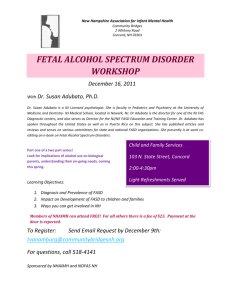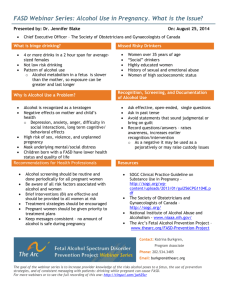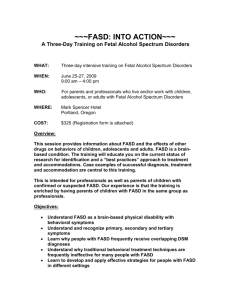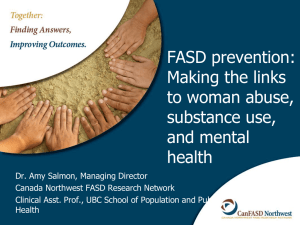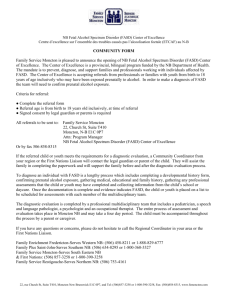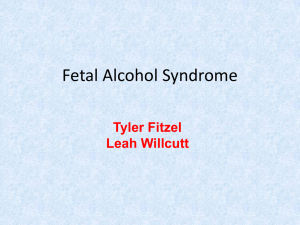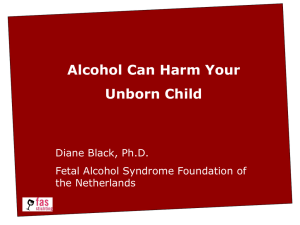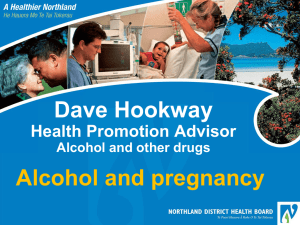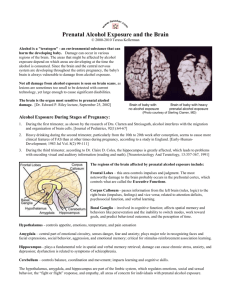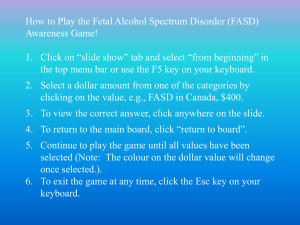Fetal Alcohol Spectrum Disorders & Underage Drinking Prevention
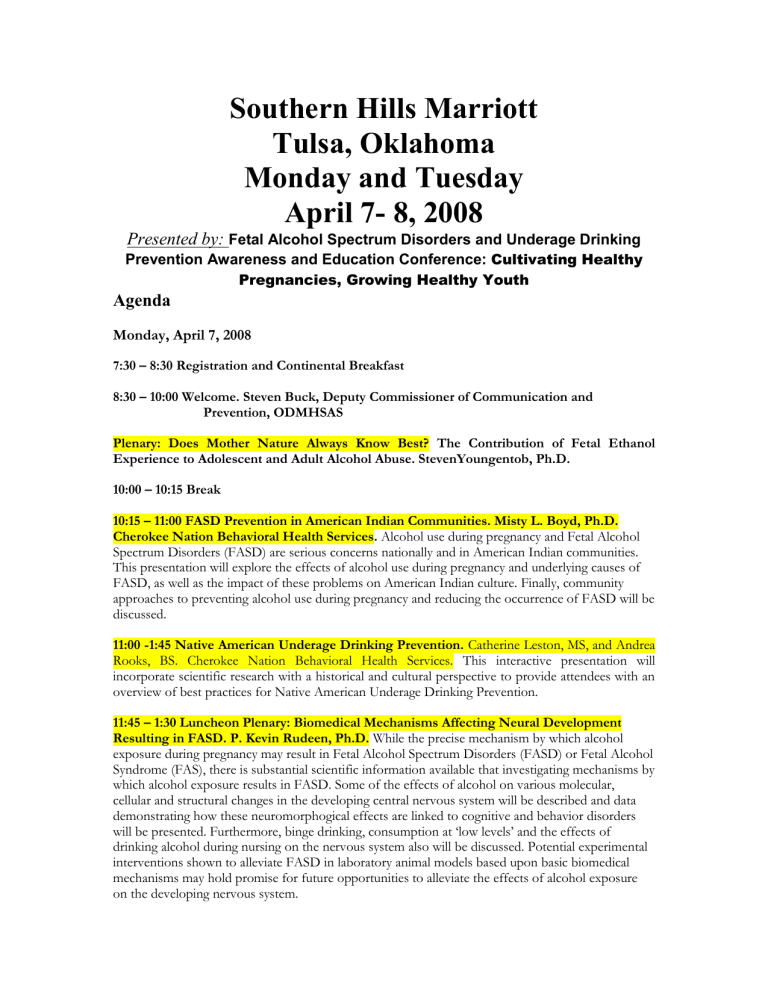
Southern Hills Marriott
Tulsa, Oklahoma
Monday and Tuesday
April 7- 8, 2008
Presented by:
Fetal Alcohol Spectrum Disorders and Underage Drinking
Prevention Awareness and Education Conference:
Cultivating Healthy
Pregnancies, Growing Healthy Youth
Agenda
Monday, April 7, 2008
7
:30 – 8:30 Registration and Continental Breakfast
8:30 – 10:00 Welcome. Steven Buck, Deputy Commissioner of Communication and
Prevention, ODMHSAS
Plenary: Does Mother Nature Always Know Best? The Contribution of Fetal Ethanol
Experience to Adolescent and Adult Alcohol Abuse. StevenYoungentob, Ph.D.
10:00 – 10:15 Break
10:15 – 11:00 FASD Prevention in American Indian Communities. Misty L. Boyd, Ph.D.
Cherokee Nation Behavioral Health Services. Alcohol use during pregnancy and Fetal Alcohol
Spectrum Disorders (FASD) are serious concerns nationally and in American Indian communities.
This presentation will explore the effects of alcohol use during pregnancy and underlying causes of
FASD, as well as the impact of these problems on American Indian culture. Finally, community approaches to preventing alcohol use during pregnancy and reducing the occurrence of FASD will be discussed.
11:00 -1:45 Native American Underage Drinking Prevention. Catherine Leston, MS, and Andrea
Rooks, BS. Cherokee Nation Behavioral Health Services. This interactive presentation will incorporate scientific research with a historical and cultural perspective to provide attendees with an overview of best practices for Native American Underage Drinking Prevention.
11:45 – 1:30 Luncheon Plenary: Biomedical Mechanisms Affecting Neural Development
Resulting in FASD. P. Kevin Rudeen, Ph.D. While the precise mechanism by which alcohol exposure during pregnancy may result in Fetal Alcohol Spectrum Disorders (FASD) or Fetal Alcohol
Syndrome (FAS), there is substantial scientific information available that investigating mechanisms by which alcohol exposure results in FASD. Some of the effects of alcohol on various molecular, cellular and structural changes in the developing central nervous system will be described and data demonstrating how these neuromorphogical effects are linked to cognitive and behavior disorders will be presented. Furthermore, binge drinking, consumption at ‘low levels’ and the effects of drinking alcohol during nursing on the nervous system also will be discussed. Potential experimental interventions shown to alleviate FASD in laboratory animal models based upon basic biomedical mechanisms may hold promise for future opportunities to alleviate the effects of alcohol exposure on the developing nervous system.
1:45 – 2:30 Preventing FASD: Where Do We Start? Trisha Hinson,
M.Ed., CMHT.
This workshop will share some of the FASD prevention strategies we’ve tried over the past several years in Mississippi. Also included will be lessons learned, strategic planning efforts, our system of care, and where we still need lots of work.
2:30 - 3:15 Involving Youth In Your Community Planning. Josh Cantwell, CPS and Stacy
Potter, CPS. In rural communities in Northeast Oklahoma innovative evidenced-based approaches to environmental prevention and youth development strategies have been used to engage youth so that they positively affect change in their communities. ROCMND has used youth in several parts of our planning and implementation including a mini leadership camp that has been conducted for 2 years to spin off the 2 Much 2 Lose camp conducted through the Oklahoma Highway Safety Office.
We will discuss how we get youth involved and examples of our activities.
3:15 – 3:30 Break
3:30 – 5:00 Plenary: Alcopops, Alcohol Marketing and Underage Drinking: Implications for
FASD Prevention. Jim Mosher, JD. This presentation will highlight recent trends in underage drinking and alcohol marketing, focusing particularly on “alcopops” – sweet, fruity beverages that mask the taste of alcohol. Alcopops have fueled a major shift in beverage preference from beer to distilled spirits among young people, particularly teenage girls, and are implicated in teenage binge drinking incidents. These trends pose serious risks to health and safety, including Fetal Alcohol
Syndrome Disorders. The marketing encourages underage drinking among young women of childbearing age, contribute to unplanned sexual encounters and sexual assault, and undermine
FASD prevention efforts.
Tuesday, April 8, 2008
7:30 – 8:30 Registration and Continental Breakfast (Please sign in each day)
8:30 – 9:15 Welcome. Lenae Clements, MSW, CPS. ODMHSAS
Plenary: The Strategic Prevention Framework: The Federal Perspective. Mike Lowther,
CSAP. This presentation will give a brief overview of the seven components of the Strategic
Prevention Framework; which includes assessment, capacity building, planning, implementation, evaluation, culture competency, and sustainability. In addition, the importance of this framework and how it relates to developing community action prevention plans will be discussed.
9:15-9:45 Building Community Anti-Drug Coalitions in Rural Communities. B. J. Boyd,
Ph.D. Cherokee Nation Behavioral Health Services. This presentation will focus on the use of community coalitions to prevention alcohol and substance abuse in rural communities. Specifically,
SAMHSA’s Strategic Prevention Framework will be presented as a best practice model for community-level prevention.
9:45 – 10:00 Break
10:00 – 11:30 Community Assessment. Janet Petty, CPS and Wanda James, CPS. This workshop will provide the necessary tools to identify predictors of problem behaviors and positive outcomes, identify gaps in existing community efforts, identify resources, and help communities to implement and evaluated an outcome-focused community action plan.
11:45 – 1:15 Luncheon Plenary: David Asetoyer. Who Are We? We Are Our Stories. David
Asetoyer, CCDC II. We are all Cultural People. As such, we are a collection of the stories that we have accumulated from our personal life experiences that comprise who we are today. Our stories have the power to Heal and Harm. When we examine these stories, we learn which stories to keep and which to discard. We learn to share the stories that have enriched our lives and can empower others as well.
1:30 – 3:00 Developing a Community Prevention Plan. Janet Petty, CPS and Wanda James,
CPS. This workshop is a continuation for identifying resources, and helping communities to implement and evaluate an outcome-focused community action plan.
3:00 – 3:15 Break
3:15 – 4:45 Implementation and Evaluation of Community Prevention Plan. Janet Petty, CPS
and Wanda James, CPS. This workshop will take a systematic approach in developing a community action plan.
4:45 – 5:00 Wrap-up.
